Serving 220 students in grades 6-8, Sussex County Technology Charter School ranks in the bottom 50% of all schools in New Jersey for overall test scores (math proficiency is bottom 50%, and reading proficiency is bottom 50%).
The percentage of students achieving proficiency in math is 27% (which is lower than the New Jersey state average of 36%). The percentage of students achieving proficiency in reading/language arts is 50% (which is higher than the New Jersey state average of 49%).
The student:teacher ratio of 9:1 is lower than the New Jersey state level of 11:1.
Minority enrollment is 28% of the student body (majority Hispanic), which is lower than the New Jersey state average of 62% (majority Hispanic).
Quick Stats (2025)
- School Type: Charter School
- Grades: 6-8
- Enrollment: 220 students
- Student:Teacher Ratio: 9:1
- Minority Enrollment: 28%
- Overall Testing Rank: Bottom 50% in NJ
- Math Proficiency: 27% (Btm 50%)
- Reading Proficiency: 50% (Top 50%)
- Science Proficiency: 6-9% (Btm 50%)
- Source: National Center for Education Statistics (NCES), NJ Dept. of Education
Top Rankings
Sussex County Technology Charter School ranks among the top 20% of public schools in New Jersey for:
Category
Attribute
Community Size
Student Attention
School Overview
Sussex County Technology Charter School's student population of 220 students has stayed relatively flat over five school years.
The teacher population of 24 teachers has stayed relatively flat over five school years.
School Type
Grades Offered
Grades 6-8
Total Students
220 students
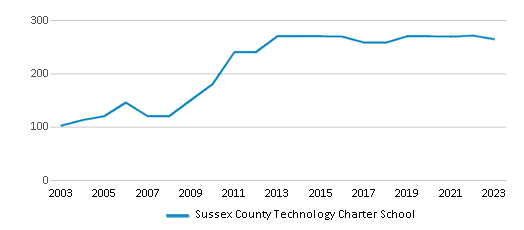
Gender %
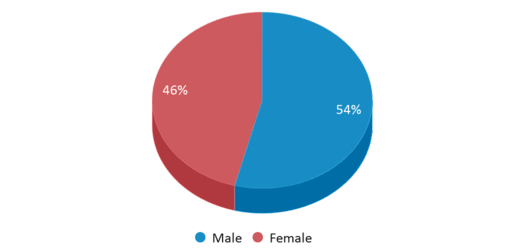
Total Classroom Teachers
24 teachers
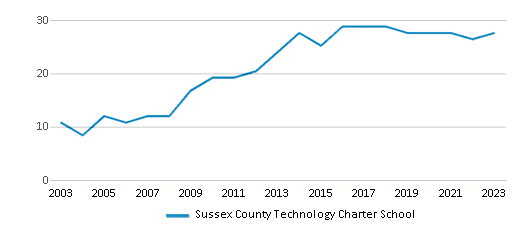
Students by Grade
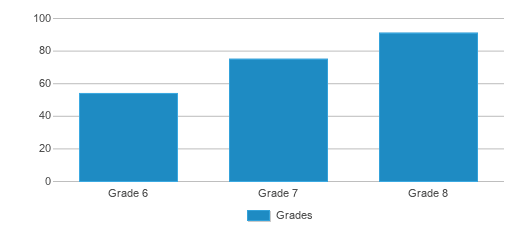
School Rankings
Sussex County Technology Charter School ranks within the bottom 50% of all 2,201 schools in New Jersey (based off of combined math and reading proficiency testing data).
The diversity score of Sussex County Technology Charter School is 0.45, which is less than the diversity score at state average of 0.72. The school's diversity has stayed relatively flat over five school years.
Overall Testing Rank
#1262 out of 2201 schools
(Bottom 50%)
(Bottom 50%)
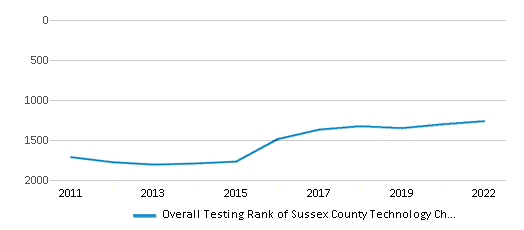
Math Test Scores (% Proficient)
27%
36%
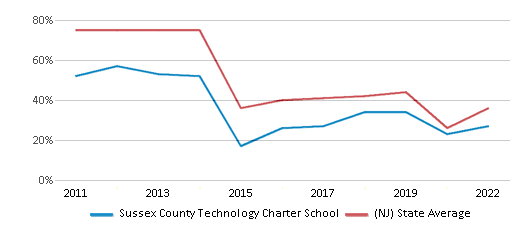
Reading/Language Arts Test Scores (% Proficient)
50%
49%
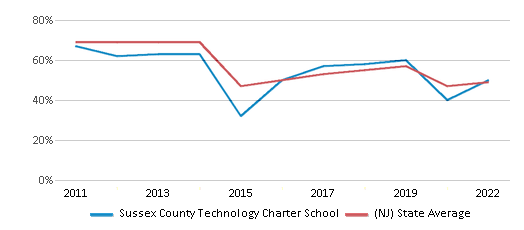
Science Test Scores (% Proficient)
6-9%
23%
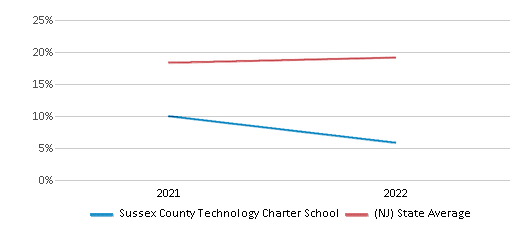
Student : Teacher Ratio
9:1
11:1
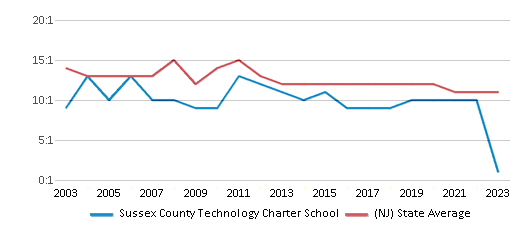
American Indian
1%
n/a
Asian
n/a
10%
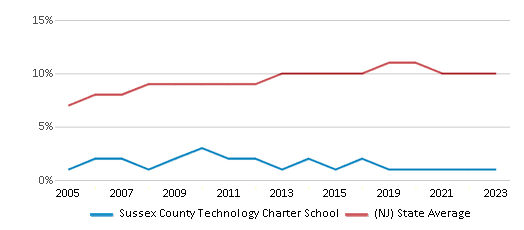
Hispanic
16%
34%
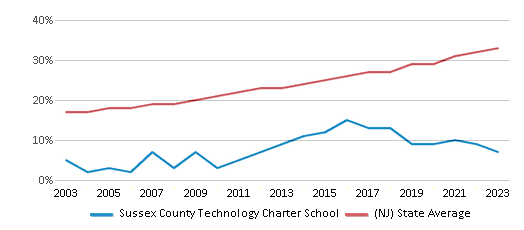
Black
n/a
15%
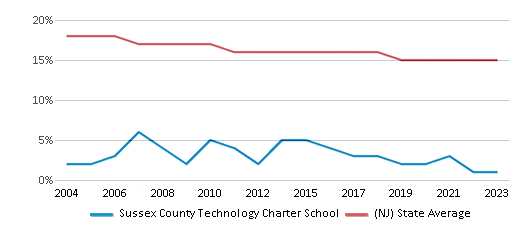
White
72%
38%
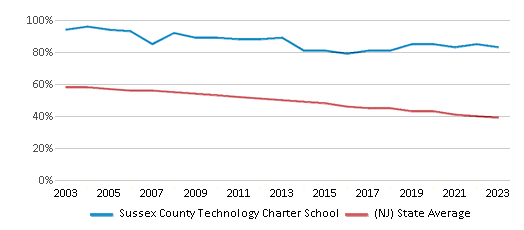
Hawaiian
n/a
n/a
Two or more races
11%
3%
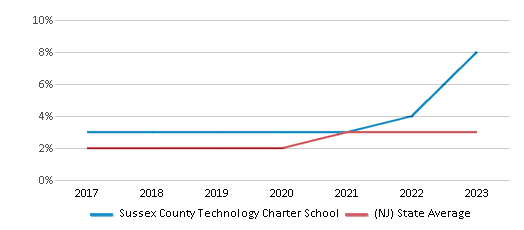
All Ethnic Groups
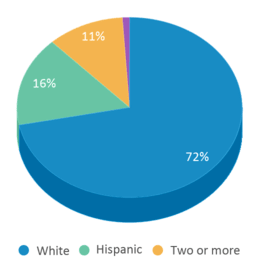
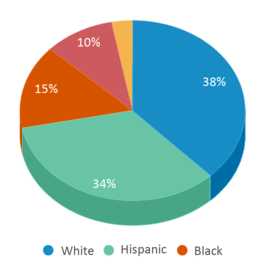
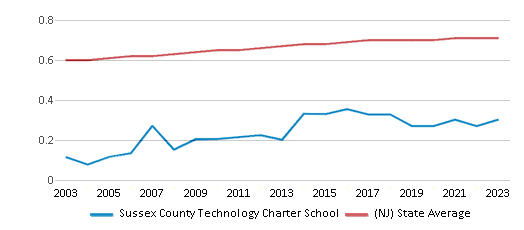
Eligible for Free Lunch
18%
32%
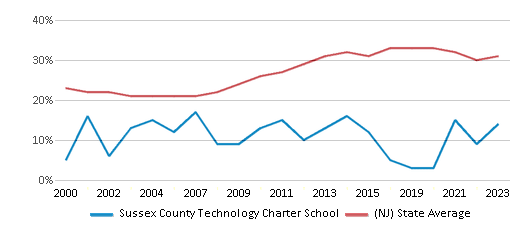
Eligible for Reduced Lunch
6%
6%
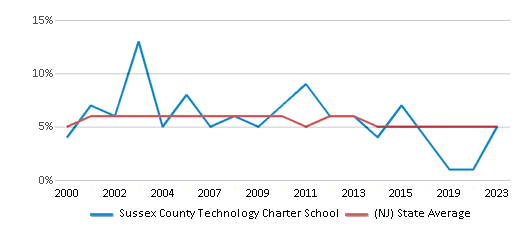
School Statewide Testing
School District Name
Source: National Center for Education Statistics (NCES), NJ Dept. of Education
Profile last updated: 02/09/2025
Frequently Asked Questions
What is Sussex County Technology Charter School's ranking?
Sussex County Technology Charter School is ranked #1262 out of 2,201 schools, which ranks it among the bottom 50% of public schools in New Jersey.
What percent of students have achieved state testing proficiency in math and reading?
27% of students have achieved math proficiency (compared to the 36% NJ state average), while 50% of students have achieved reading proficiency (compared to the 49% NJ state average).
How many students attend Sussex County Technology Charter School?
220 students attend Sussex County Technology Charter School.
What is the racial composition of the student body?
72% of Sussex County Technology Charter School students are White, 16% of students are Hispanic, 11% of students are Two or more races, and 1% of students are American Indian.
What is the student:teacher ratio of Sussex County Technology Charter School?
Sussex County Technology Charter School has a student ration of 9:1, which is lower than the New Jersey state average of 11:1.
What grades does Sussex County Technology Charter School offer ?
Sussex County Technology Charter School offers enrollment in grades 6-8
What school district is Sussex County Technology Charter School part of?
Sussex County Technology Charter School is part of Sussex County Technology Charter School District.
School Reviews
5 3/20/2020
This school has been wonderful for us - particularly compared to our sending district of Vernon, NJ. Both of my boys were so unhappy there, unchallenged and suffered from bullying and just a negative atmosphere in the schools. They hated going to school and as I became more familiar with the Vernon schools; I hated sending them there. Then we discovered the Charter School, and it was a wonderful change. The atmosphere is warm and welcoming. The student body is small, and everyone knows everyone else. It's generally caring and warm - with some exceptions for the usual middle school drama, of course!! The class sizes are so nice and small, and children are allowed to learn in the manner that best suits their learning style. It's far less restrictive and more creative/interactive than the learning style in Vernon. For my boys, this has suited them very well. All of a sudden, they were interested in learning, at the same time that their class sizes went from 23 or more (in Vernon) to 12 or 13 (in Charter). What a welcome change!!! Clubs and activities are good, there are sports and trips and assemblies, just like in any other school. Teachers are WAY more responsive at Charter than they ever were in Vernon. They actually reach out to ask me about things or to share information. That NEVER happened in Vernon!!! This has been a great change for us. My sons even persuaded other of their friends from Vernon to transfer to Charter, with comparable positive results. Our family highly recommends it.
Review Sussex County Technology Charter School. Reviews should be a few sentences in length. Please include any comments on:
- Quality of academic programs, teachers, and facilities
- Availability of music, art, sports and other extracurricular activities
Recent Articles

What Is A Charter School?
Explore the world of charter schools in this comprehensive guide. Learn about their history, how they operate, and the pros and cons of this educational innovation. Discover key facts about charter schools, including admission policies, demographics, and funding, as well as what to look for when considering a charter school for your child.

10 Reasons Why High School Sports Benefit Students
Discover the 10 compelling reasons why high school sports are beneficial for students. This comprehensive article explores how athletics enhance academic performance, foster personal growth, and develop crucial life skills. From improved fitness and time management to leadership development and community representation, learn why participating in high school sports can be a game-changer for students' overall success and well-being.

February 05, 2025
Understanding the U.S. Department of Education: Structure, Impact, and EvolutionWe explore how the Department of Education shapes American education, from its cabinet-level leadership to its impact on millions of students, written for general audiences seeking clarity on this vital institution.





